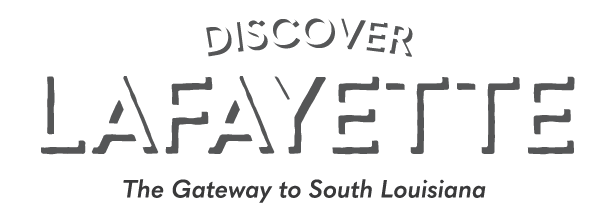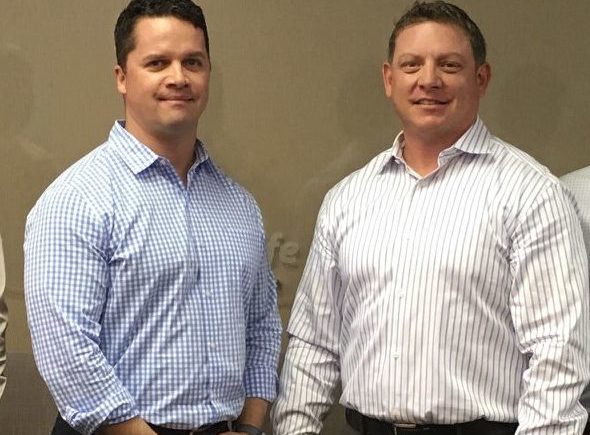Podcast: Play in new window | Download (Duration: 39:13 — 53.9MB)
Casey Hoyt and Michael Moore, founders of VieMed Healthcare, Inc., the largest independent non-invasive ventilation therapy provider in the U S., joined Jan Swift of Discover Lafayette to discuss their journey. They were joined by Casey’s dad, Max Hoyt, who has been a mentor, investor, and V. P. of Governmental Relations for VieMed until recently. They shared their journey in building a highly successful organization based upon mutual respect of their partner’s talents as well as having each other’s back at all times.
Close friends since their college years, they met through their mutual friend, the late Brad Dunphy. Even while hanging out in college, Casey and Mike always enjoyed talking business.
Casey learned at an early age how to work with others and for others, having grown up under the tutelage of his dad, Max Hoyt, who had started several businesses of his own, most notably Pixus Digital Printing. Starting in the work force at 15 years of age at Hub City Diner, Casey was always working and gained invaluable experience in the sales field selling alarms for ADT and “learned how to get 25 ‘No’s’ for each ‘Yes’.” He had found success running NimLock Louisiana (now VOXX), an exhibit and trade show service company.
Michael Moore had gotten into respiratory therapy sales at the age of 17. He found he enjoyed working with patients and loved the fundamental of sales. He had worked for a mom and pop durable medical equipment business and had built strong relationships in the healthcare industry and with local physicians.
By 2006, both Casey and Mike were ready for a new challenge and knew they could effectively combine their skills in business management (Casey) and sales (Mike.) Wanting to keep respiratory medicine front and center, the resulting endeavor was a new company, Sleep Management, which originally provided CPAPs for physicians’ sleep labs.
A change in Medicare rules in 2008 allowed for home-based sleep apnea testing, and they first worked to get physician-run sleep labs to opt in to this new at-home treatment for patients. As Mike says, “It really failed!”
So they took a leap of faith and opened their own sleep apnea testing company called “Home Sleep Delivery,” the first of its kind in Louisiana and only one of five in the country at the time. Payers weren’t even covering the procedure at that time, but they knew it was just a matter of time before the home sleep treatment industry would be transformed and become mainstream. As Casey says, “Mike was always a good salesperson. We had a tiger by the tail the minute we turned on the light switch.”
Test devices are mailed to patients and then mailed back to Home Sleep Delivery; thereafter therapy for the patient is delivered via mail and the device set up by video call with assistance from the company. That business has continued to grow and Casey and Mike look back on that early home therapy option as a precursor of how people are now successfully operating remotely during COVID times.
Casey and Mike have stayed focus on respiratory issues as their business has grown and branched out. While most people locally still look upon their business as focused on sleep apnea testing and treatment, that market is actually only 5% of their revenue. Yet, that sleep market is what led them into treating sick patients with lung disease.
VieMed provides equipment and home-based healthcare to serve patients with Chronic Obstructive Pulmonary Disease and other respiratory issues. It was in 2012 that they entered the non-invasive ventilator (NIV) therapy arm of their business as a distributor when Philips brought this life-changing device onto the market. In 2014, they rebranded to “VieMed” to more accurately reflect their business mission. “The non-invasive therapy market was” ripe for the picking” and demand was sky-high.
VieMed is based in Lafayette LA and employs 505 full-time employees across the country, with a total of approximately 800 employees when you factor in part-time workers. They just hired about 200 workers for a Contact Tracing Center in Arizona and cover 39 states (while being licensed for business in all 50 states). They can operate successfully without having to have a traditional brick and mortar presence, although some states do require a physical presence in order to conduct business. Most therapists operate out of their vehicles and “drop everything to get to the patient as quickly as possible when needed. We put the patient first, no matter what,” says Casey.
VieMed had invested in telehealth and was in pilot mode back in March 2020 when the pandemic hit the U. S. They fast-tracked their telehealth model and put out smartphone apps for their patients. With 3500 patients currently being treated on VieMed’s telehealth app, both patients and therapists are able to avoid unnecessary exposure to others. The app has also improved efficiencies in workflow and allowed the therapists to spend more time with patients, checking in more frequently.
“The biggest thing to come out of the pandemic is the adoption by physicians of telehealth. It’s now a real thing. CMS (Center for Medicare and Medicaid Services) has made regulatory changes to allow telehealth. It’s here to stay.”
VieMed currently has 5% market penetration in the U. S. with its noninvasive ventilator product, as it is still new to many physicians. Casey lamented that this means that “95% of patients go home from the hospital without this help, and will end up returning to the hospital.” They have about 8000 active patients and have treated approximately 50,000 patients over the years.
Most patients are end of life with Stage 4 COPD and the average length of stay with a patient is 17 months. Both Casey and Mike expressed the joy they receive from helping others regain a “spark, to regain a quality of life not possible without NIV. You can’t reverse or cure COPD but in most cases, you can keep patients out of the hospital. To prolong life and enhance the quality of life of a patient” drives their mission to provide the highest level of care to those most in need.
VieMed has worked to educate physicians nationwide on the efficiency of the noninvasive ventilator and invested in studies conducted by Harvard Medical School and KPMG, a big 4 accounting firm. Results of the effectiveness study of NIV have been astounding: for every six patients treated, VieMed saves one life. It is also a cost-effective treatment option, as the studies showed that $20,000 per year per patient is saved by treating patients at home rather than in the hospital.
When the coronavirus pandemic hit the U. S. in March 2020, VieMed became a go-to source for much-needed ventilators. Hospitals, physicians, and 15 to 16 state governments reached out for ventilators when the surge first hit and ventilators were scarce. Casey and Mike believe VieMed’s biggest strength has been in teaching clinicians and hospitals how to assemble and use the ventilators; they made about 30 videos in a matter of 48 hours that taught clinicians how to use a home ventilator during peak surge periods when people were scrambling to help patients breathe. “Our biggest strength is being able to deploy help.”
A non-invasive ventilator uses a sealed mask that covers the nose and mouth. Hospitals are no longer immediately intubating patients who present with breathing issues relating to COVID, as the treatment was not saving lives and 100 oxygen saturation was too much for the patients. NIV is easier on the lungs to handle and is much less traumatic than the traditional ventilator that requires intubation. “Now, COVID patients can go home. VieMed monitors the patient with a Pulse Ox Sensor which measures blood oxygen saturation.” This technology has been critical in allowing COVID patients to go home from the hospital.
Their patients have on average a 5.4% re-admission rate to hospitals vs the 20% industry standard. This success is not only wonderful for the patient but brings about significant savings to hospitals who are reimbursed on the basis of patient outcomes.
VieMed has experienced market growth primarily in the Deep South and up into the Coal Miners Belt. Strong in Louisiana, they are also active in Kentucky, West Virginia, Tennessee, Missouri, Oklahoma, and Texas. 75% of their business is in rural sectors of the country. VA patients are three times more likely to have COPD due to exposure to Agent Orange. They company also helps ALS patients, as well as pediatric patients born prematurely. Some patients will keep their ventilators for 10, even 25 years.
Max Hoyt has been a valued mentor and stepped up “Shark Tank” style when the company hit year two of business and needed an infusion of cash. “We were selling so much, we were literally growing ourselves out of business. Our industry is paid on a schedule and we needed financial help to weather our growth. Max not only invested in their future, but helped steer them away from bumps in the road,” Casey said. They were young and learning their way. Casey also attributed Randy Dobbs, Chairman of the Board of VieMed, as being a great mentor. “It’s nice to have a mentor from outside our family. Other people can help you if you collaborate with them. It can be hard because your business is your baby that you started from the ground up. It’s your vision. But getting another opinion from the outside is invaluable.”
VieMed has experienced extraordinary growth and was the winner of the 2020 Junior Achievement of Acadiana’s Large Business of the Year.
When our guests were asked why they’ve stayed in Lafayette when their business could be located anywhere in the country, they all expressed their love of their home.
Casey Hoyt: “The thing I love most about being in Lafayette are the people, culture and entrepreneurial spirit that is inside of this town. There are people walking around and all they want is to see you succeed. That is what makes this community special. It’s not a cutthroat community. We are all genuinely trying to help others climb the ladder.”
Mike Moore: As we’ve tried to grow this business and recruit talent from outside, we are batting 1000. We get people in for a two or three-day tour. We take them out to dinner, to the best spots, and we always end it with a hunt or a fishing trip. It’s rare that someone doesn’t say, Wow, I see this place as my new this as their new home. We’ve been very successful getting out of staters and people from outside the country to uproot their entire family to move here…..the culture here, the people here…..there’s something about this place that will lure you in and keep you here. It’s a great place to grow up and raise kids.”
Max Hoyt: “Lafayette has a lot of advantages, our fiber network certainly helped keep us on the technological cutting edge. So we have all the tools here that you don’t need to move to Silicon Valley to get better services. It’s a combination of our people, technology, culture, and crawfish!”
To find out more about VieMed, visit https://www.viemed.com. Thanks to Casey and Max Hoyt, and Michael Moore, for sharing their story. VieMed is an example of our community’s unbeatable entrepreneurial spirit embedded with the love of family and place.




